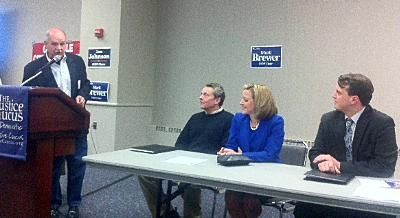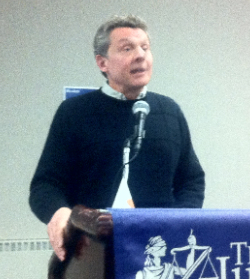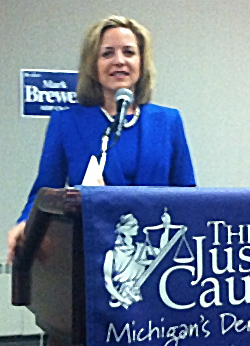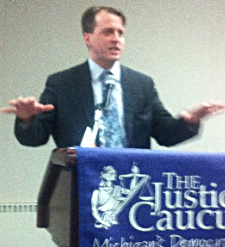This should be a non-partisan issue
 As I wrote about last week, the Justice Caucus of the Michigan Democratic Party held a discussion panel at the statewide convention on Saturday titled “Citizens United v. FEC – The Invisible ‘Person’ in Michigan Elections”. Organized by former Washtenaw County Democratic Party Chair and well-known Michigan attorney and activist Stu Dowty, the panel discussion was wide-ranging and covered everything from undisclosed donors in our judicial elections to the repeal of the odious Citizens United Supreme Court ruling.
As I wrote about last week, the Justice Caucus of the Michigan Democratic Party held a discussion panel at the statewide convention on Saturday titled “Citizens United v. FEC – The Invisible ‘Person’ in Michigan Elections”. Organized by former Washtenaw County Democratic Party Chair and well-known Michigan attorney and activist Stu Dowty, the panel discussion was wide-ranging and covered everything from undisclosed donors in our judicial elections to the repeal of the odious Citizens United Supreme Court ruling.

Rich Robinson, Executive Director of the Michigan Campaign Finance Network, got things started with a discussion about “dark money”, untraceable campaign donations from unnamed sources, influencing our judicial races. Robinson, with the aid of charts, showed how spending on our state Supreme Court races has skyrocketed in recent years. “If we don’t know where the money, the campaign contributions, are coming from,” Robinson said, “We don’t know if our judges are ruling on cases involving their major donors.”
 In the last Supreme Court race in 2012, Robinson said that as much as three-quarters of the money spent on the campaign was “off the books” with the donors of millions of dollars never revealed.
In the last Supreme Court race in 2012, Robinson said that as much as three-quarters of the money spent on the campaign was “off the books” with the donors of millions of dollars never revealed.
Robison spoke about the use of PAC money in advertising, saying that it must be spent on issue advertising only without endorsing candidates.
“But there’s a disconnect,” he said, “Because judges aren’t ‘lobbyable’ entities. Yet, there is no such thing as authentic issue advocacy in judicial campaigns.”
You can get more information about dark money in our judicial (and other) campaigns at the Michigan Campaign Finance Network website.
 Next up was Jocelyn Benson, author, Dean of the Wayne State University Law School and former candidate for Michigan Secretary of State. In her 2010 race for Secretary of State, Benson said she raised over $1 million transparently from the voters of Michigan. Her opponent, Ruth Johnson, raised twice that much yet reported only about $200,000 of it, mostly contributions “from people with the last name of DeVos”. Because so much of the money she raised came from unknown sources, Benson said, “We don’t know who is influencing her and the bad decisions coming out of her office.”
Next up was Jocelyn Benson, author, Dean of the Wayne State University Law School and former candidate for Michigan Secretary of State. In her 2010 race for Secretary of State, Benson said she raised over $1 million transparently from the voters of Michigan. Her opponent, Ruth Johnson, raised twice that much yet reported only about $200,000 of it, mostly contributions “from people with the last name of DeVos”. Because so much of the money she raised came from unknown sources, Benson said, “We don’t know who is influencing her and the bad decisions coming out of her office.”
Benson heads up a group called the Michigan Transparency Coalition that is trying to make sure that campaign financing is open and transparent so that Michigan citizens know who is having the most influence on our government. But they shouldn’t have to do this if our Secretary of State was doing her job and fighting to make sure our elections are free from the corrupting influence of money. “The work Rich [Robinson] does should be the role of our government,” Benson said.
Benson talked about the transparency ballot initiative the Michigan Transparency Coalition is going to bring back in 2014. This is an important first step, with others to follow, to correct the situation we find ourselves in today, she said.
“We need to work strategically to fight for transparency and disclosure,” said Benson. “Too often we focus on one thing and think we’re done.” We need a multi-pronged approach. In her mind that means reforming transparency and disclosure laws regarding campaign finance followed by work on a constitutional amendment like the one proposed by the Move To Amend coalition to declare, once and for all that money is not speech and that corporations are not people.
 The final speaker was state House Representative Jeff Irwin from Ann Arbor. Part of Democratic minority in the House, Irwin talked about the efforts he and other Democrats will be pushing this legislative session.
The final speaker was state House Representative Jeff Irwin from Ann Arbor. Part of Democratic minority in the House, Irwin talked about the efforts he and other Democrats will be pushing this legislative session.
Talking about reforming our election and campaign finance laws, he said, “This not only the right thing to do, it’s a strategically smart thing to do for Democrats”. If we’re successful, he said, it will help get “Koch brothers money” and the influence of the right wing American Legislative Exchange Council (ALEC) out of our state elections and government.
Irwin talked about three different initiatives. First is an effort to reform the laws governing disclosure by lobbyists. “There is an army of lobbyists in Lansing,” he told the audience, “All of them are trying to influence our votes. For every lobbyist pushing for environmental protections, there are ten trying to roll back those protections.”
Irwin described how Michigan has some of the weakest laws in the country when it comes to disclosure by lobbyists. He said that lobbyists only have to report their expenditures when they spend over $55 in a single month on a single legislator. “Think about it. That means they can spend over $600 per legislator each year to influence our vote without reporting it,” he said. “We will introduce legislation that will require reporting from the first dollar spent.”
Second, Irwin said, we need better financial disclosure from candidates. Here, too, Michigan has some of the weakest laws in the country since legislators don’t have to file annual financial disclosures. This lack of transparency leads to influence that is untraceable.
“Republicans probably aren’t going to vote for this legislation,” Irwin said, “But, by introducing the bills, they will be forced to show their allegiances in this fight.”
Finally, Democrats will tackle campaign finance reform to campaign financing, exposing dark money and forcing candidates to disclose who their donors are. The timing on this will be crucial, according to Irwin.
“Our House Speaker, Jase Bolger, is facing a one-person grand jury investigation right now,” Irwin reminded the audience. The best time to push for these reforms may be when the results of that investigation are made public.
I asked Rep. Irwin if there was any chance that some of the newer tea party legislators may join Democrats in supporting these reforms since they talk frequently about transparency and open government.
“Well, some of them may be supportive of this,” he replied. “Unfortunately, their leadership, who have been around a long time and have benefited from the way things are now, will fight it. So that will make passage very difficult.”
It was a terrific panel and I commend Stu Dowty and the Justice Caucus for putting it on. This topic is clearly one that has a lot of interest as nearly 300 people filled the room, making it standing room only. As Stu told the audience in his closing remarks, there are multiple efforts to repeal Citizens United and amend the U.S. Constitution to enact these important reforms. Just as importantly, there are hundreds of state and local efforts that are ongoing across the country and the effort has barely begun.
If you are in the Washtenaw County area and would like to get more involved in the effort to repeal the Citizens United ruling, create more transparency in campaign financing in Michigan and the country as a whole, and to reform our election laws to eliminate influence by corporations and wealthy individuals, join the “Up To Us” working group. Contact Stu Dowty at sndowty@yahoo.com to get on our mailing list and find out more.
[Crappy iPhone photos by Chris Savage]



